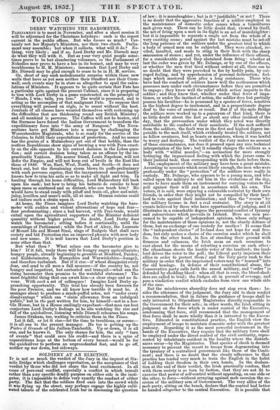TOPICS OF THE DAY.
DERBY WATCHING THE BAROMETER. PARLIAMENT is to meet in November, and after a short session it will be adjourned for the Christmas holydays : such is the report current in the public offices.. But who knows as much? Cer- tainly not her Majesty's Ministers, nor their two chiefs. Parlia- ment may assemble; but when it collects, what will it do ? No- thing, very likely ; and if so, Lord Derby and Mr. Disraeli may do what they will with it. But as your very quiet people some- times prove to be but slumbering volcanoes, so the Parliament of Nobodies may prove to have a bee in its bonnet, and may be very troublesome to H. M. Ministers ; insomuch that Lord Derby and Mr. Disraeli may be glad enough to cease to be in H. M. service. Or, short of any such melodramatic surprise within those new walls that have as yet seen neither their Strafford nor their Crom- well, such events may be in store as altogether to spoil the calcu- lations of Ministers. It appears to be quite certain that Fate has a particular spite against the present Cabinet, since it is preparing to toss with Lord Derby in a game constructed on the principle of "Heads, I win ; tails, you lose." The world is possessed, and is acting as the accomplice of that malignant Fate. To suppose that everything will proceed en regle, is to count without the host. Journals of all classes have wearied themselves with reckoning up the difficulties that are thickening round any British Ministry ; and all mankind is perverse. The Caffres will not be beaten, and the Burmese have forced the Indian Government to transform the expeditionary force into "the army of Rangoon." The Nova- scotians have got Ministers into a scrape by challenging the Worcestershire Magistrate, who is so ready for the service of the Colonies, to fulfil their expectations of protection. And" no sooner has the genius of a Malmesbury got out of that hobble, than the restless Republicans show signs of brewing a war with Peru exact- ly on the side opposite to his correct decision in the Lobos ques- tion; said correct decision being taken as an offence by the im- practicable Yankees. His nearer friend, Louis Napoleon, will not
defer the Empire and will not keep out of broils in the 'East like those of 1840. Empire, East, West, North, and South—it does not break out, but the threatening storm blows its puffs-preliminary with such perverse caprice, that the inexperienced mariner hardly knows how to trim his sails so as to make all tight and trim. In hauling through his home difficulties, Lord Malmesbury fell back upon his cook ; but how to bring his batterie de cuisine to bear upon races so scattered and so distant, who can teach him ? He would have to stand ready with pilaff and train-oil, ghee and mint- julep, bouillon and mare's milk, all at once. Human cuisine could
mot endure such a strain -upon it. -
At home, the Times imagines Lord Derby watching the baro-
meter with sudden and violent alternations of hope and fear— fear predominating ; since a bad harvest, with Free-trade, would -entail upon the agricultural supporters of the Minister deficient quantity withoat higher prices. No doubt, Lord Derby does watch the barometer ; sitting before it continually, until the assemblage of Parliament ; while the Poet of Alroy, the Laureate of Mount Ida and Mount Sinai, sings of Budgets that shall save -society and bid Protection rise an improved phcenix with new body and new name. It is well known that Lord Derby's position is • none other than that.
But what then ? What solace can• the barometer give to ? If it fall, truly there will be hungry angry agriculturists;
hungry people, already beginning to grumble at Bradford, Paisley, and Kidderminster, in Hampshire and Warwickshire.—hungry, and therefore turbulent. But if it rise—if wheat disappoint every ',fear, and send to all men a full measure—if the country be, not 'hungry and impatient, but contented and tranquil—what can the rising barometer then promise to the watchful statesman ? The most frightful thing that can await him—a clear stage and no fa- vour. With such a set of colleagues ! Imagine Lord Derby ap- proaching opportunity. This trial has already been foreseen for the poor Premier, and we all know how terrible it must be. A manager about to produce a much-puffed actor, not "under every 'disadvantage" which can "claim allowance from an indulgent -publie," but in the Part written for him, by himself—not in a hos- tile House, but in a House smilingly expectant—that man can best 'conjecture Lord Derby's feelings as he sits watching the rise and fall of the quicksilver, listening while Disraeli rehearses his songs. Tames Graham, too, waiting to criticize them in the Times. Let it fall, or let it rise—let the time be troublous; or serene— it is all one to the present manager. He too is getting up the Pietro ii Grande of his Tullien-Tamberlik. lip or down, it is all
-one, and he knows it. The only chance for him, the only "turn of events" that could save his credit—and there is a spice of superstitious hope at the bottom of every breast—would be for the quicksilver to perform an unprecedented feat, and to go off, neither up nor down, but sideways.


























 Previous page
Previous page